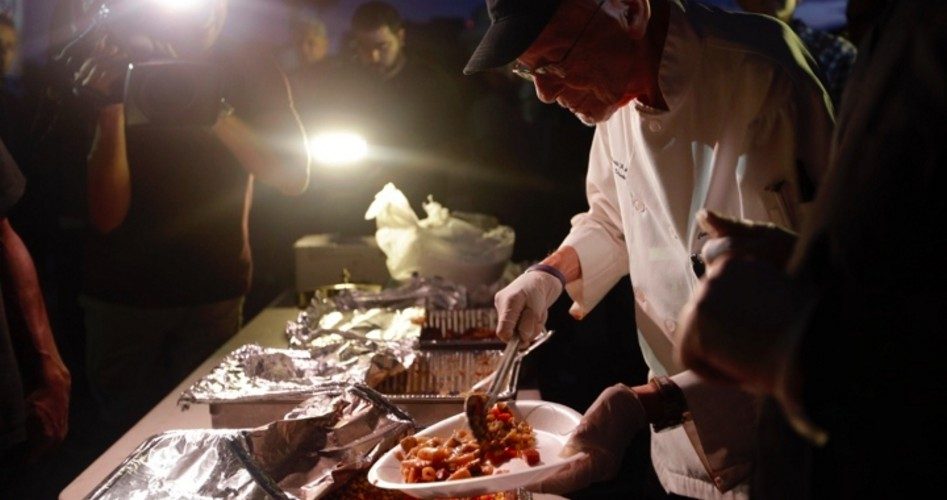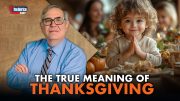
Despite being threatened with jail time and fines, 90-year-old “Chef” Arnold Abbott, two local pastors, and a wide array of activists vowed to continue feeding the poor in Fort Lauderdale, Florida, even after being cited by police this month. Local politicians behind the recent anti-homeless-feeding rule say they do not think the strategy pursued by the Good Samaritans is “effective” for dealing with the poor. However, supporters of the defiant homeless feeders, who are now making headlines around the world, say the city’s latest restrictions on helping the poor represent a violation of the constitutionally protected rights to free speech, freedom of religion, assembly, and more. They plan to keep feeding no matter what officials say.
Controversy formally began after the city of Fort Lauderdale last month enacted a ban on feeding the poor in public. Among other restrictions, the ordinance forces charities and others who wish to aid the homeless to provide portable toilets and running water — something that is hard to do on a shoe-string budget aimed at providing maximum assistance to the poor. They must also comply with food safety regulations. Violators can face up to 60 days in jail or a $500 fine. Nonagenarian Abbott has already been cited multiple times for continuing to feed the homeless in public while a lawsuit against the policy makes its way through the courts.
Supporters of the policy said it was justified due to health and safety concerns, citing issues such as public urination in parks and near businesses. Proponents also pointed out that it is still possible to help the poor — provided it is done indoors and in accordance with the new regulations, which have actually been relaxed slightly when it comes to feeding the poor on private property or in designated churches. More than a few supporters of the new crackdown claimed that “homeless activists” and the media were unfairly demonizing city officials trying to deal with public concerns in an allegedly humane way.
Local leaders, meanwhile, also insist that they want the homeless to get more “comprehensive” assistance and services from authorities. They argue that outdoor feeding programs only put a “Band-Aid” on the issue. “Mr. Abbott has decided that he doesn’t think these individuals should have to have any interaction with government; that they should be fed in the parks. We disagree,” Fort Lauderdale Mayor Jack Seiler, a Democrat, was quoted as saying in press reports after the local controversy sparked a global firestorm when reports that Abbott and clergymen were arrested began making the rounds.
For critics, however, the policy represents an attack on freedom, constitutionally protected rights, charity, and the poor. “We tried to explain to the police — this is my religion — this is deep within the DNA of my Christian church,” Pastor Dwayne Black with The Sanctuary Church in Fort Lauderdale, one of the men cited by police for violating the local ordinance, told the Christian Post. “Christ said, ‘Feed my sheep.’ This is deep within us.” Another clergyman, Mark Sims of St. Mary Magdalene Episcopal Church, is also speaking out after being cited, telling Fox News that “people of faith are compelled to reach out to people who are in need.”
A team of heavy-weight Fort Lauderdale lawyers has now taken up the case, according to media reports. “This ordinance is not treating everyone in our community equally,” said attorney William Scherer, who is representing Sims in challenging the rule, during a press conference. “My client and Chef Abbott have as much right to have people there that they serve food to as I did for my children’s 4th of July picnic over there.” The lawyer also said the ordinance unconstitutionally restricts the speech, religious freedom, and the right of people to assemble.
Abbott, a World War II veteran who founded the Love Thy Neighbor ministry, has been feeding the hungry and the poor in his community for two decades. And despite the recent troubles with local authorities, he plans to keep going. “We will continue as long as there is breath in my body,” the nonagenarian told the Sun Sentinel newspaper after being arrested for defying the ban. Since the new law was enacted, Abbott has been cited three times for criminal violation of the ordinance and was ordered to appear in court. He was not actually taken to jail; though, in theory, he could serve time behind bars for defying the ban.
He still defends his actions. “These are the poorest of the poor,” Abbott explained about those he serves. “They have nothing. They don’t have a roof over their heads. How do you turn them away? I don’t do things to purposefully aggravate the situation. I’m trying to work with the city. Any human has the right to help his fellow man.” After the public outcry, even the mayor, who still backs the policy, acknowledged that Abbott was engaged in “a very kind, compassionate act.”
While openly flouting the ordinance, Abbott is also challenging the new rule in court. He is hoping a judge will issue an order preventing city officials from enforcing their new ban. In 2000, a court ruled that Abbott could continue his charitable activities despite a similar ordinance, so he is asking the judicial branch to intervene once again to protect the so-called “mass feedings” he organizes for the homeless on the beach and in local parks. “I am trying to allow homeless people to have the same rights as everyone else,” Abbott was quoted as saying. “There is no rug big enough to sweep them under.” Due to its warm weather, Florida has an especially high number of homeless citizens.
News of the controversial new policy in Fort Lauderdale quickly spread around the country like wildfire, even making headlines in foreign countries. When reports declared that the 90-year old activist and charity worker had been arrested for feeding the homeless, the outcry was deafening. Numerous groups from across the political spectrum rallied to the defense of Abbott and the two local ministers. From the local Libertarian Party to an assortment of far-left groups, outrage was everywhere. In Fort Lauderdale, the backlash has been particularly fierce, with dozens of protesters — some reportedly from out of town — protesting against the ordinance outside the Democrat mayor’s home.
County and local officials also rushed to distance themselves from the controversial policy. “I don’t want to judge the Fort Lauderdale City Commission and the way they’ve done things, but it’s not the course of action I would’ve chosen for Broward County,” Broward County Sheriff Scott Israel was quoted as saying in media reports. “I would’ve gone in a different direction.” With Fort Lauderdale and Broward County in the media spotlight and facing intense criticism — some analysts called it a PR nightmare — Israel took to Twitter to reiterate that the county was not involved in the city government’s decision to restrict aid to the homeless.
Among others who have rallied in defense of the right to feed the poor is the local Libertarian Party. On December 17, party leaders and supporters are planning to provide food for the homeless “without asking permission” from city officials. “The mayor and his council want to be mommy and daddy,” said a statement posted by the county party on its Facebook page for organizing the feeding event. “They want monopoly control over all of us. One way they exercise this desire is to regulate how to feed the homeless.” Hundreds of people have vowed to participate in the civil disobedience.
On the other end of the political spectrum, Nathan Pim, an activist with “Food Not Bombs” whose wife is currently on a hunger strike to protest the ordinance, also blasted the move as unnecessarily criminalizing the homeless. “Food is a right and not a privilege, and we believe in the importance of public spaces for public use,” Pim was quoted as claiming in media reports, arguing that the law “is now encouraging starvation.”
With Fort Lauderdale’s new ordinance becoming a celebrated cause for activists around the world and across the political spectrum, the chances that Abbott or the ministers will be thrown in jail over defying the ban are probably slim. The courts may even decide to throw out the rules entirely. Still, activists are hoping the controversy will shine the spotlight on what critics say are increasingly aggressive anti-poor policies in Fort Lauderdale and across much of Florida. Jesus Christ clearly instructed His followers to feed to poor, so Christian charity workers argue that it is actually a religious obligation to help those in need. Whether the courts will agree remains to be seen.
Photo shows Arnold Abbott serving food to the poor from a public parking lot next to the beach: AP Images
Alex Newman is a correspondent for The New American, covering economics, education, politics, and more. Follow him on Twitter @ALEXNEWMAN_JOU. He can be reached at [email protected]



